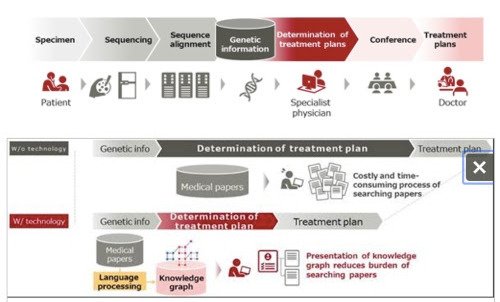
Image 1: Positioning of the Investigation of Treatment Plans in Cancer Genomic Medicine; Image 2: Effect of introducing this technology
Fujitsu, on 7 Nov 2019, announced the results of a joint research project it has been conducting with the Institute of Medical Science at the University of Tokyo since April 2018. As part of this joint research, Fujitsu Laboratories Ltd. has successfully developed and verified AI technology to improve the efficiency of treatment planning in cancer genomic medicine, demonstrating its effectiveness through verification experiments at the Institute of Medical Science at the University of Tokyo.
In the field of cancer genomic medicine, creating treatment plans derived from genomic information remains a costly and time-consuming process. The newly developed technology extracts from a vast body of research and academic papers to generate a knowledge graph of cancer genomic medicine that can be used for creating treatment plans, including the effects of a given course of treatment. Verification trial experiments using this technology have allowed the Department of Hematology and Oncology at the Institute of Medical Science, the University of Tokyo to reduce the amount of work required to determine a treatment plan for acute myeloid leukaemia by more than half, delivering improved efficiency.
Moving forward, Fujitsu Laboratories will support the work of medical doctors by expanding the technology to deal with a greater range of cancer types and contribute to the overall advancement of cancer genomic medicine. The technology is on display at "Fujitsu Forum Munich 2019" in Munich, Germany, from Wednesday, November 6.
Development Background
The goal of cancer genomic medicine is to provide optimal medical care for each patient by identifying genomic mutations in cancer patients and predicting the likelihood of disease, as well as drug response and side effects. Starting from June 2019 in Japan, cancer gene panel testing has been covered by health insurance, and industry experts anticipate an increasing number of patients to seek further testing.
Presently, in the field of cancer genomic medicine, it remains necessary for specialist physicians to painstakingly search for relevant articles one by one from a database and determine appropriate treatment methods as well as their effects on the patient (Figure 1). To address these challenges, Fujitsu Laboratories and the Institute of Medical Science at the University of Tokyo's launched a joint AI research project beginning in April 2018 to improve the efficiency and sophistication of the work of physicians specializing in cancer genomics, subsequently conducting a verification trial for the technology.
Outline of the Verification Trials
Trial Period: July 2018 to September 2019
Trial Location: Department of Hematology and Oncology, the Institute of Medical Science at the University of Tokyo
Developed technology: The new technology automatically generates a database of knowledge on the relationship between gene mutations and therapeutic drugs, and the relationship between therapeutic drugs and their effects, drawing from medical papers. This is accomplished by integrating Fujitsu's AI technology for language processing, which identifies terms and phrases used in research papers from context, as well as the insight of information needed to discuss treatment policies identified by the Institute of Medical Science at the University of Tokyo.
Verification Trial Details: With the newly developed technology, 2.4 million elements of relationships from 860,000 medical papers are automatically extracted as knowledge to construct a knowledge graph database for cancer genomic medicine. In this study, the time required for 4 physicians specializing in haematological malignancies at the Institute of Medical Science at the University of Tokyo to search and examine papers using the technology based on past cases of acute myeloid leukaemia is measured, and the efficiency of examination work with and without the newly developed technology is evaluated (Image 2). For this verification experiment, a database developed by Fujitsu Limited in cooperation with the Japan Agency for Medical Research and Development as part of the "Program for an Integrated Database of Clinical and Genomic Information" is used as part of the knowledge graph.
Results: The technology reduced the burden of reading the entire paper by presenting the knowledge extracted from each paper and enabled users to focus on pertinent aspects of research alone. As a result, it was confirmed that the new technology can reduce the amount of time spent on this task by more than half, compared with the average of about 30 minutes per each study it took in the past. At present, it is estimated that more than 12,000 people suffer from leukaemia annually in Japan, and if genomic medical treatments are administered to all of them using this new technology, the 6,000 hours of examination work normally required for experts can be shortened to 3,000 hours or less, considerably expediting the process of determining the treatment appropriate for each patient.
Future Plans: Technology developed at Fujitsu Laboratories to explain the reason and rationale behind AI decision-making are to be used in conjunction with this technology in order to further improve the efficiency of the genomic mutation curation process. Fujitsu will further use the knowledge graph for precision medicine developed through this joint research to improve the efficiency of the study of gene mutations for a wide range of cancer types, and actively promote the development of cancer genomics in clinical practice.




